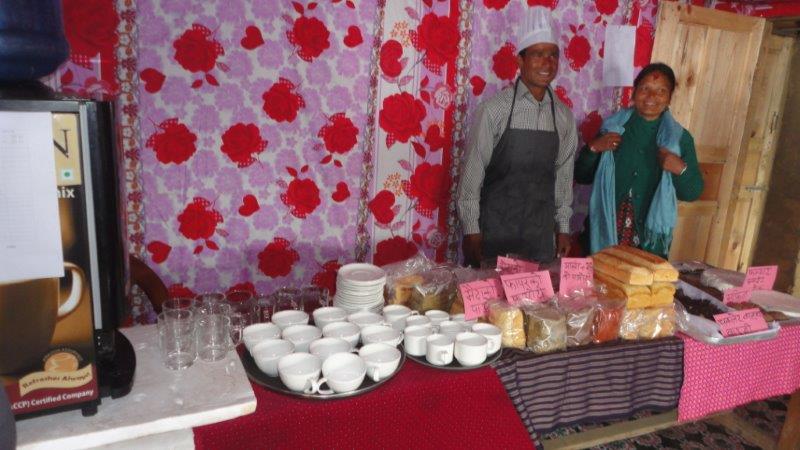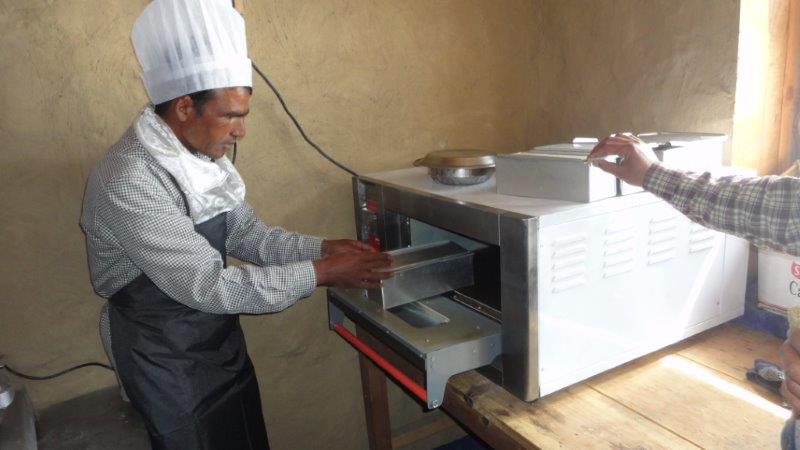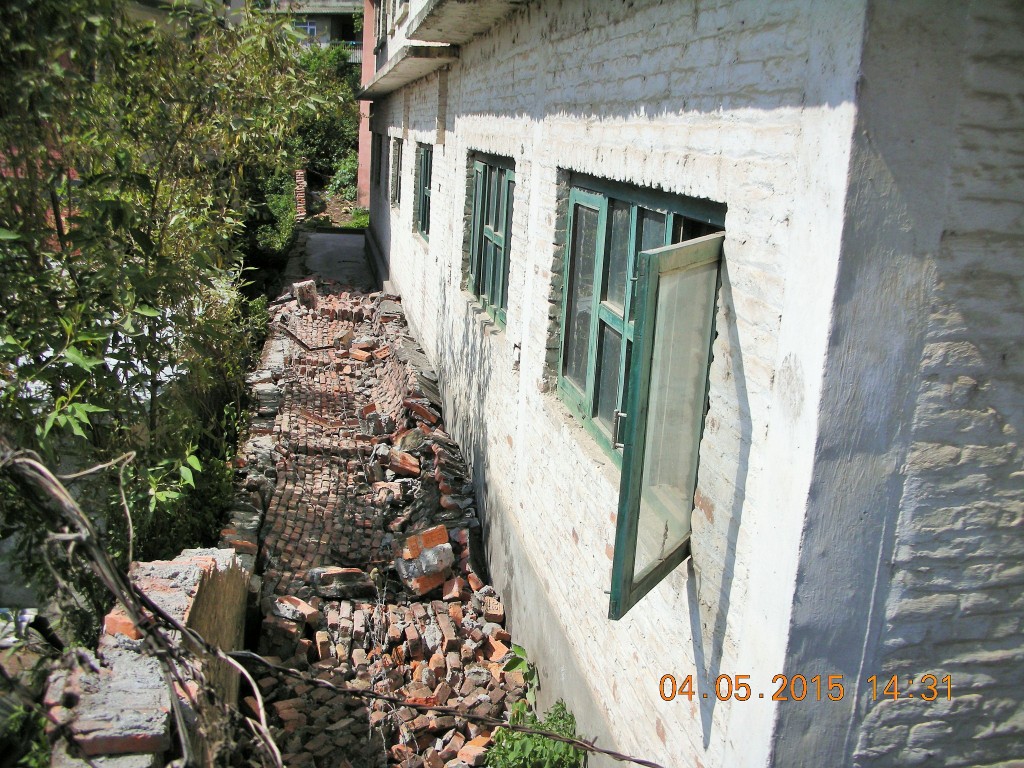READI Nepal Humla Delights Café Now Open for Business
Raj, the chairman of READI, has sent a wonderful report. The young man, Mr. Shiva, who went to Kathmandu for training, learnt well (thanks to the helpful manager of the Himalayan Java Coffee shop) how to make a variety of drinks and to bake many delicious breads and treats. He then bought, with their advice, a coffee machine, a bread making machine, glasses, cups and saucers, 3 tables and 12 chairs, a carpet – and set off back to Simikot.

The lovely sign was carved in Kathmandu and represents the old and the new (English words in traditional Tibetan script) and the local culture of yak travel (the yak is trotting along holding a steaming cup of coffee on its back!). A grand opening was held on April 14, with 200 invited guests (government officials, teachers, tour operators) who were asked for their honest opinion.
It was all going so well – then the earthquake struck on April 25 and although it was distant, people were fearful to go inside buildings. So the food and drink went out to the people, with Mr. Shiva supplying coffee and food to office staff.

He is also baking breads for the children’s tiffin (lunch) and they are loving the taste of their local grains used in new ways. He is getting requests for Tibetan momos and other local favourites – so it seems like a success! Time will tell, but we applaud READI for an innovative way to raise funds for the children’s hostel and education.

Nepal Earthquakes Update
All TRAS partners and the children and families whom our projects support are safe, thank goodness, and damage seems to be minimal. At the same time, many are still sleeping outside, and the worries of the impending monsoon rains are only too real.
But just when things seemed to settle down after the April and May earthquakes nearer Kathmandu, we heard on May 23 that a 4.8 tremor hit far away Simikot, the tiny town where READI Nepal looks after 30 children in a rented hostel and is providing them with a good start in life. They are all safe, but scared stiff, and are currently sleeping outside in two very old tents. Mim Hamal, their director who works in Kathmandu, has been able to help out by finding two good tents and shipping them to Simikot this weekend. They have been planning to fundraise to build a proper hostel for the children – now they want to make sure it will be truly earthquake-proof.

Schools have been closed for a month and many people from Kathmandu have gone home to their villages to assess local damage. So we do not yet know the full picture of how our project partners are faring or what their needs will be in the long term.
TRAS starts a Nepal Rebuilding Fund One immediate request we have had for help in rebuilding is from the Tibetan Department of Education (DOE) with whom we have supported many projects over the years. Tibetans in Nepal are in a tenuous situation at the best of times, and now that their villages and buildings have suffered so much, they are desperate for funds for rebuilding. The DOE looks after 12 schools in Nepal, and 4 of these are damaged, although thankfully the children are safe. They receive no help at all from the Nepalese government or from the large international aid groups, so are turning to their long-time supporters for help. Here, for instance, is a photo of the badly damaged outer support wall at the Atisha Primary School, in Jawalakhel, Kathmandu. There are 57 pupils there, from pre-primary to Class 5.

We expect READI Nepal will have costs related to last week’s tremor in Simikot, and the building of safe housing for the children. As things get sorted out, we know we will hear of more needs. Let’s start a ‘rebuilding and preparedness fund’ to help our partners cope with the unexpected and difficult problems they are facing in putting their lives back together and preparing for a safer future. Please help them by making a donation to this fund.
Mark your donation ‘Nepal Rebuilding Fund’. Our goal is $10,000 by the end of June. Thank you in advance for your generosity. Late Flash: North Vancouver students who visited Nepal in March/April have already donated $1,500 to this fund!
Earthquake in Nepal – update
We are very relieved to report that the staff and children at the Buddha Academy Boarding School are safe. The school is not in session at the moment so the number of children is reduced. It is reported that those remaining are living outside in the rain for the next little while in fear of further tremors. We have also heard from our other partners in the region, Voice of Children and READI Nepal, who advise they have been unaffected.
Nepal Earthquake – April 25, 2015
We are deeply saddened to hear of the devastating earthquake in Nepal and are anxiously awaiting word as to how our partners are affected. We will post updates as we learn more.
